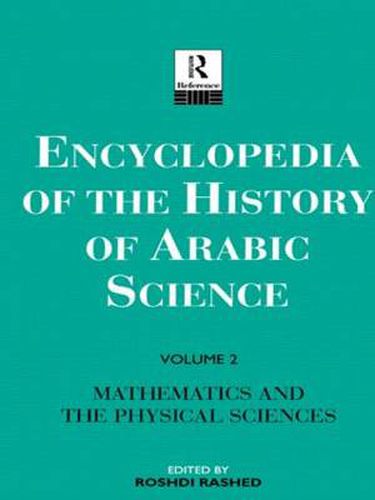Readings Newsletter
Become a Readings Member to make your shopping experience even easier.
Sign in or sign up for free!
You’re not far away from qualifying for FREE standard shipping within Australia
You’ve qualified for FREE standard shipping within Australia
The cart is loading…






The Arabic contribution is fundamental to the history of science, mathematics and technology, but until now no single publication has offered an up-to-date synthesis of knowledge in this area. In three fully-illustrated volumes the Encyclopedia of the History of Arabic Science documents the history and philosophy of Arabic science from the earliest times to the present day. The set as a whole covers seven centuries. Thirty chapters, written by an international team of specialists from Europe, America, the Middle East and Russia cover such areas as astronomy, mathematics, music, engineering, nautical science and scientific institutions. Structure The Encyclopedia is divided into three volumes: 1) Astronomy - Theoretical and Applied 2) Mathematics and the Physical Sciences 3) Technology, Alchemy and Life Sciences Illustrated with figures, tables and plates, each chapter is written by an internationally respected expert in their field. Each volume contains an extensive bibliography of sources and further reading, and the set is fully indexed. The Encyclopedia of the History of Arabic Science is a unique and vital contribution to its subject. The Encyclopedia will not only be essential reading for students and scholars of Arabic science, the history of science and Islamic studies, but will also be of enormous interest to mathematicians, engineers and life scientists. Key Features * An in-depth history of scientific development in the Arabic world over the last seven centuries * entries compiled by a prestigious team of international specialist contributors * extensive bibliography of sources and further reading * fully-indexed * 100 tables, figures and plates, complementing and illuminating the text. UK Contributors include: Donald Hill, University College, London; F. Maddison, Museum of the History of Sciences; G.A. Russell, Wellcome Institute
$9.00 standard shipping within Australia
FREE standard shipping within Australia for orders over $100.00
Express & International shipping calculated at checkout
The Arabic contribution is fundamental to the history of science, mathematics and technology, but until now no single publication has offered an up-to-date synthesis of knowledge in this area. In three fully-illustrated volumes the Encyclopedia of the History of Arabic Science documents the history and philosophy of Arabic science from the earliest times to the present day. The set as a whole covers seven centuries. Thirty chapters, written by an international team of specialists from Europe, America, the Middle East and Russia cover such areas as astronomy, mathematics, music, engineering, nautical science and scientific institutions. Structure The Encyclopedia is divided into three volumes: 1) Astronomy - Theoretical and Applied 2) Mathematics and the Physical Sciences 3) Technology, Alchemy and Life Sciences Illustrated with figures, tables and plates, each chapter is written by an internationally respected expert in their field. Each volume contains an extensive bibliography of sources and further reading, and the set is fully indexed. The Encyclopedia of the History of Arabic Science is a unique and vital contribution to its subject. The Encyclopedia will not only be essential reading for students and scholars of Arabic science, the history of science and Islamic studies, but will also be of enormous interest to mathematicians, engineers and life scientists. Key Features * An in-depth history of scientific development in the Arabic world over the last seven centuries * entries compiled by a prestigious team of international specialist contributors * extensive bibliography of sources and further reading * fully-indexed * 100 tables, figures and plates, complementing and illuminating the text. UK Contributors include: Donald Hill, University College, London; F. Maddison, Museum of the History of Sciences; G.A. Russell, Wellcome Institute